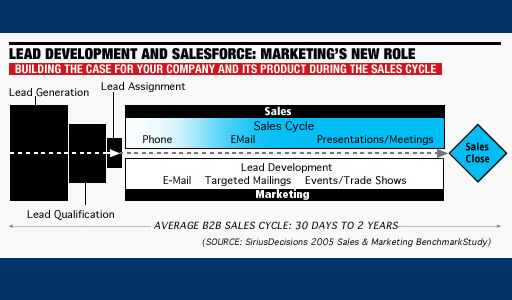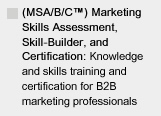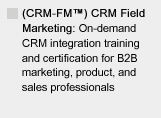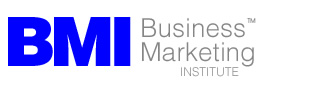MAKE SURE YOU CONTINUE TO RECEIVE EACH ISSUE OF TUESDAY MARKETING NOTES—CLICK HERE TO RENEW YOUR FREE SUBSCRIPTION
On-Demand CRM and The New Marketing Model: Using Clear Presentation and "Show What You Know" for Effective Lead Development (Part 2)
By Eric Gagnon
Last week, in part one of this two-parter on the New Marketing Model, we described the revolution in business-to-business marketing programs being brought about by CRM systems like Salesforce.com and others, and how the changes introduced by CRM systems require shifts in the ways all of us as B2B marketers plan, develop, and execute our marketing programs.
Partnering with Sales by Executing Effective Lead Development Programs
Among the most important of these changes is the need for marketers to develop effective, ongoing lead development programs. In business-to-business marketing, buying decisions are often long deliberations, because products sold in these markets are expensive, complex, and may substantially impact business operations. Also, there are often several people involved in the purchase decision at the prospective buyer’s company. For these reasons, the process of making sales, by converting leads generated from an ad, mailing, trade show or other activity that is part of your marketing plan, into buyers of your product, requires a long-term lead development effort.
Many Prospects Take a Year or More to Buy, But Has Your Marketing Program Already Stopped Talking to Them?
According to a recent study, conducted by Reed Business Information, of 40,000 prospects who responded to ads and press releases for products in the manufacturing field:
• Six months after inquiring, just 23% of these prospects actually purchased the product they inquired on;
• 25% bought the advertised product within seven to 12 months later, and
• 47% purchased the product a year or more later
While this survey shows the majority of business-to-business purchases occur well beyond six months after the lead is generated, according to lead generation and development expert Brian Carroll, president of inTouch, Inc. and author of Lead Generation for the Complex Sale, most sales reps fail to follow up on longer-term leads. The primary cause, according to Carroll, are that sales reps focus instead on closing their most immediate and rewarding short-term selling opportunities to meet their next sales target or quota.

Given these circumstances, there is clearly a need for marketing professionals to work with their sales teams to develop lead development programs. These are specialized and often highly targeted marketing efforts directed to prospects in the company’s CRM system and leads database. Lead development generates ROI by measuring conversion rates as prospects are converted customers during the sales cycle.
With the advent of CRM systems used in B2B marketing, the current, “old way” of doing business, where marketing generated the leads and threw them over the cubicle wall to sales, now adds lead development as a new and important part of every business marketers’ professional role.
CRM Makes Efficient, Highly Targeted Lead Development Programs Possible
CRM systems are the optimal platform for running effective, measurable lead development programs. Lead development programs utilize e-mail, phone, and in-person communications between sales reps and their prospects, as well as conventional marketing media (such as targeted direct mail and editorial and promotional e-mail) targeted to prospects, to continue the process of answering the prospect’s questions about your company’s product, making the case for your product as the best solution to the prospect’s business, technical, or applications problem.
During the many months of the sales cycle, an effective lead development program helps to communicate your company’s reputation and unique expertise. Over time, as your sales rep earns their prospect’s trust with the help of your lead development program, the prospect decides that your company and its product are their best choice, and places their first order.
Every activity in your marketing program devoted to lead development can be integrated, tracked, and measured using CRM systems. For example, standard e-mail message templates, to provide sales reps with effective notes, letters, reports, presentations, and other communications with prospects, can be stored in a CRM system's online document library or other CRM storage location and made available to your sales team. By adding specialized, third-party e-mail programs, bulk and autoresponder-based e-mail messages can be sent to hundreds of prospects, and their response tracked and measured using your CRM system. You can also use your CRM system to plan, execute, and coordinate followup on other, “offline” marketing activities targeted toward current and longer-term prospects, such as mailings for new product or special price offers, advertising campaigns, and appearances by your company at upcoming trade shows.
Clear Presentation: The First Step to Building Measurable Marketing Programs for Lead Generation and Lead Development
Prospects in business-to-business markets assess products and approach their buying process differently than buyers in consumer markets do, and B2B marketing programs target audiences in business, technical, or other specialized vertical markets. These potential buyers are interested in price, features, and information on how they can put your product to work to solve a problem in their business, their operation, or their technical process.
Most important—and especially during the lead development process— prospects in a B2B market want to know how using your product solves the business problem or issue they face. Producing effective marketing programs that generate solid sales response on the “front end” (lead generation) of your marketing program, following through to the critical lead development stage of your program, requires clear presentation, an important element of the New Marketing Model.
Clear presentation means using clear, simple, direct language to communicate the known sales benefits of your company’s product, using benefits seen as compelling by your potential prospects in all marketing deliverables—advertising, direct mail, e-mail, the Internet, or any other marketing tool or medium, and using bold presentation and layout techniques to make your sales message as obvious as possible to the largest number of readers and viewers in your market.
Nowhere is the use of clear presentation more important than in new online advertising media, such as e-mail, your company’s Web site, and Google AdWords keyword search text ad programs. Prospects in business-to-business markets have trained themselves to disbelieve the standard marketing hype and brochure copy they see in advertising everywhere around them. Because of this, they go online to seek clear answers to their questions, and to assess and compare product features from numerous vendors to carefully research each product’s application to their need. When prospects read your company’s marketing deliverables, they want hard facts, features, answers to their immediate questions about your product, and problem-solving “reasons to buy.“
Clear presentation is the driving principle for creating ads, mailings, and other marketing programs that generate strong sales response, which is the first step to making your marketing program measurable in a CRM system.
Clear presentation, combined with appeals to the motivations that drive your prospects, build strong sales response. The best sales copy appeals to the timeless human motivations that drive every one of your potential prospects; for example, the need to increase revenues, to be more productive or efficient, or to save money. These sales copy techniques were perfected decades ago by John Caples, Claude Hopkins, Rosser Reeves, and the other early innovators in advertising and direct mail, and it’s a known fact that many of today’s top copywriters producing Google AdWords keyword advertising programs study and imitate the techniques of these old masters.
Using “Show What You Know” to Establish Thought Leadership and Unique Positioning for Your Company and Its Product
Another critical element to building strong positioning for your company and its product in your market is putting the principle of “show what you know” to work in your marketing program.
“Show what you know” is based on the principle that every company possesses unique knowledge in its business, systems, product development, or manufacturing processes, the special knowledge and expertise held by its executive and technical staff, and other insights into how the company’s products help customers solve their problem, that it can utilize to help sell its products to new potential buyers.
“Show what you know“ uses deliverables like white papers, reports, case studies, and other non-promotional editorial formats to package and present this your company’s unique knowledge, both as premiums used in ads, mailings, and other lead generation activities, and during the lead development process, where it is especially valuable in helping your sales team answer the important questions asked by their prospects about your products and their problem-solving applications, and to uniquely position your company as the prospect’s best choice in their purchase decision.
Using CRM systems, you can utilize white papers, case studies, reports, and other critical ”show what you know” deliverables in “spot” e-mail contacts between your sales team and their prospects, in ongoing e-mail messaging programs for lead development, as premiums used in Google Adwords keyword search text advertising, and as standalone deliverables stored in your company’s CRM document library, for ready access by your company’s sales team.
In today’s mature markets, where there’s often not much apparent difference between one company’s product and another’s, you gain the edge for your company by uniquely positioning its expertise using “show what you know.” Tapping this expertise, and presenting it to sell your company and its products, is now a major business marketing strategy for developing more effective, and more measurable, lead generation and lead development programs.
Eric Gagnon (eric@businessmarketinginstitute.com) is the author of the CRM Field Marketing Handbook, the core content study guide for the BMI CRM Field Marketing system.








